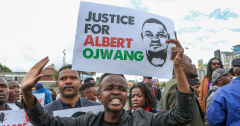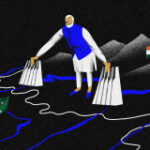Nairobi, Kenya – On June 7, Albert Ojwang was visiting his parents in his home village of Kakoth in Kenya’s Homa Bay County. His mother had just served him ugali (maize meal) and sukuma wiki (kale) for lunch when police officers on motorbikes arrived at the family’s compound.
Before Ojwang could take a first bite, they arrested him, taking him to the local Mawego police station before transporting him 350km (200 miles) to the Central Police Station in the capital, Nairobi.
The officers told his parents he had committed an abuse against a senior government official and was being arrested for publishing “false information” about the man on social media.
Ojwang, a blogger and teacher, had no criminal record and was just a month shy of his 31st birthday. But it was a celebration he would not live to see because less than a day later he was dead.
Police said he died by suicide after “hitting his head” against the wall of a cell where he was being held alone. But after an uproar from the public and rights groups and further investigation, the claim did not hold up. Eventually, two police officers were arrested.
Still, the public anger that erupted after Ojwang’s death did not abate.
Kenyans have been on tenterhooks since mass antigovernment protests erupted across the country a year ago – first against tax increases in a finance bill and later for the resignation of President William Ruto.
In the time since, police have been accused of human rights abuses, including allegations of government critics and activists being abducted and tortured.
Ojwang was seen by many as yet another victim of a system trying to silence those attempting to hold the government to account.
And in the month since his death, angry protests have soared; state violence – and deaths – against civilians have continued; and young people seem determined not to give in.

‘False and malicious information’
Ojwang was the only child of Eucabeth Ojwang and Meshack Opiyo, a retired quarry worker who had endured hard labour for 20 years in Kilifi County to send his son to school.
Opiyo left the back-breaking job after Albert Ojwang had secured a job as a teacher, hoping his son would help take care of the family after earning a degree in education.
“I had only one child. There’s no daughter. There’s no other son after him,” he told Al Jazeera. “I have suffered … while [working] in a quarry in Timbo for 20 years so that my child could go through school and earn a degree,” he added, saying Ojwang left behind a three-year-old son.
Ojwang was a promising teacher at Kituma Boys’ Secondary School in the coastal Taita Taveta County, about 700km (435 miles) southeast of his childhood home, his family said.
Media reports said he was linked to an account on X that several people used to publish news about Kenya’s government and politics. That’s what drew the attention of the authorities who came to his father’s house that June afternoon.
That day, the arresting officers assured Opiyo his son would be safe when they took him into custody. Overnight, the father left for Nairobi – taking his land title deed with him to use as a surety to bail his son out because he had no other money. But the news he received was of his son’s death.
“I thought we would come and solve this issue. I even have a title deed here in my pocket that I had armed myself with, so that if there were going to be need for bail, we would talk with a lawyer to bail him,” Opiyo told journalists the Sunday morning after his son’s death, having just learned what had happened to him.
Despite police claims that Ojwang died from self-inflicted injuries, his family and the public were sceptical. Human rights advocates and social media users alleged foul play and an official cover-up by police.
As public pressure mounted on the police to offer clarity, Inspector General of Police Douglas Kanja confirmed that his deputy, Eliud Lagat, was the senior official who had made a “formal complaint” that led to Ojwang’s arrest.
“The complaint alleged that false and malicious information had been published against him [Lagat] in the X – that is, formerly Twitter – social media platform. The post claimed that he was involved in corruption within the National Police Service,” Kanja said before Kenya’s Senate and the media on June 11.

At first, Kanja repeated to the media that Ojwang had hit his head on the wall, killing himself in the process. But when questioned by lawmakers in the Senate, he admitted that was incorrect.
“Going by the report that we have gotten from IPOA [Independent Policing Oversight Authority], it is not true; he did not hit his head against the wall,” Kanja said. “I tender my apology on behalf of the National Police Service because of that information.”
A team of five government pathologists also released a report that revealed severe head injuries, neck compression and multiple soft tissue traumas. The cause of Ojwang’s death, they determined, was a result of the injuries, not a self-inflicted incident.
Meanwhile, Ann Wanjiku, the IPOA vice chairperson, told senators that preliminary findings showed Ojwang was alone in the cell but two witnesses who were in the next cell said they heard loud screams from where Ojwang was held.
The IPOA report also suggested there was foul play at the Nairobi Police Station because CCTV cameras had been tampered with on Sunday morning after Ojwang’s death.
Subsequently, several people were arrested and investigated, including two police officers who have been charged.
Police Constable James Mukhwana, an officer arrested and arraigned in court over Ojwang’s death, told IPOA investigators that he had acted on orders of his boss.
“It is an order from the boss. You cannot decline an order from your superior. If you refuse, something may happen to you,” he said in a statement to the IPOA. He added that his superior told him: “I want you to go to the cell and look at those who have been in remand for long. Tell them there is work I want them to do. There is a prisoner being brought in. Take care of him.”
Mukhwana pleaded not guilty in court but said he was sorry about the death in his statement, adding: “Ojwang was not meant to be killed but to be disciplined as per instruction.”
Who is ‘sanctioning’ these killings?
Since Ojwang’s death, Kenyan rights organisations have condemned what they say is his “murder”, calling the failure by authorities to hold accountable those responsible for police brutality as disrespect for human rights.
“The savage beating to death of Albert Ojwang and the subsequent attempts to cover this up shatter once more the reputation of the leadership of the Kenyan Police Service,” Irungu Houghton, the executive director at Amnesty International Kenya, told Al Jazeera.
“Amnesty International Kenya believes the failure to hold officers and their commanders accountable for two successive years of police brutality has bred the current impunity and disrespect for human rights,” he said.
Houghton also called for all those implicated to step aside and allow for investigations to take place.
“To restore public confidence and trust, all officers implicated must be arrested. … Investigations must be fair, thorough and swift. This moment demands no less.”
Amnesty has previously called out police abuses, including “excessive force and violence during protests”, and reported abductions of civilians by security forces. Rights groups said more than 90 people have been forcibly disappeared since June 2024.
“Albert Ojwang’s killing in a police station comes after persistent repeated police denials that the normal chain of police command is not responsible for the 65 deaths and 90-plus enforced disappearances seen in 2024,” Houghton said.
“Who are the officers abducting and killing those who criti





